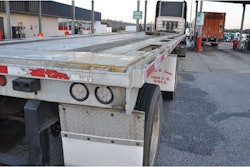Audit delays cross-border plan
U.S. transportation officials said they are working to meet a federal audit’s requirements before starting in the next few weeks the cross-border pilot trucking program with Mexico, including monitoring and placing tracking devices on Mexican trucks.
 Truck traffic at the southern border could increase soon if issues raised in a federal audit are adequately addressed.
Truck traffic at the southern border could increase soon if issues raised in a federal audit are adequately addressed.The U.S. Office of Inspector General’s Aug. 19 audit of the Federal Motor Carrier Safety Administration’s pilot program concluded the agency had adequate border inspections, but more action is necessary to meet U.S. regulations.
Federal law requires the OIG report to Congress on the program. FMCSA must address the office’s concerns before Mexican trucks cross the border.
FMCSA’s response to the report noted action or plans to satisfy these requirements before the end of September, when the report was expected to be sent to Congress.
In June, FMCSA officials told OIG they will comply with the law for conducting Pre-Authority Safety Audits and compliance reviews, but have not developed plans and safeguards for conducting PASAs in Mexico.
Two Mexican carriers, Grupo Behr De Baja of Tijuana and Transportes Olympic of Monterrey, have successfully completed the PASAs. FMCSA said it is processing applications of three other carriers.
In a PASA review, the carrier must demonstrate it complies with requirements for drug and alcohol testing, hours of service, insurance, vehicle maintenance and inspections, and qualified drivers.
FMCSA said it has begun soliciting proposals for the electronic monitoring devices and tracking service it will require for Mexican trucks for three years. In April, it had estimated the total cost at $2.5 million, but the OIG puts that price at $3.2 million. Although the agency will retain ownership of the hardware, its plan to fund these devices has drawn criticism.
— Jill Dunn
Court asked to review pilot program
The Teamsters and Public Citizen petitioned a federal appeals court to review the Federal Motor Carrier Safety Administration’s plans to proceed with a cross-border trucking pilot program with Mexico.
The organizations filed the petition with the U.S. Court of Appeals for the Ninth Circuit. Jonathan Weissglass, an attorney with the Altshuler Berzon firm representing the Teamsters, said unlike a complaint, the petition does not detail the legal challenge that is discussed later in briefing.
He said one argument will be that the standard of comparable treatment of trucking on both sides of the border “is not met because of the lack of widespread availability of ultra-low-sulfur diesel fuel (in Mexico) and that the requirement of safety equivalence is not met because of Mexico’s lower vision standards.”
FMCSA issued a statement saying it will review the filing after it is served with the lawsuit.
In 2002, Altshuler Berzon attorneys obtained a ruling from the same appeals court for the plaintiffs and other organizations to block the previous cross-border program with Mexico, which the U.S. Supreme Court overturned in 2004.
The U.S. Court of Appeals for the District of Columbia rejected the Owner-Operator Independent Drivers Association’s request for a stay of the program Sept. 8. It will schedule oral arguments following the completion of brief filings, with the last brief due by Dec. 5
While some congressional members support the program, others oppose it, including longtime opponent Rep. Pete DeFazio. The Oregon Democrat sent a Sept. 16 letter to FMCSA Administrator Anne Ferro expressing his concern about the safety of Mexican trucks.
— Jill Dunn

Truckers will have to find alternate routes on trips to Louisville, Ky., following closure of the 50-year-old Sherman Minton Bridge. The bridge, which carries I-64 and U.S. 150 traffic across the Ohio River between Louisville and New Albany, Ind., was shut down for months after cracks were discovered in the steel structure.
Hours rule due by end of month
The Federal Motor Carrier Safety Administration appears likely to issue an hours of service final rule by its Oct. 28 deadline.
FMCSA sent a final rule to Transportation Secretary Ray LaHood Aug. 11, just two days past target date. After LaHood’s office completes consideration, the Office of Management and Budget will review the rule before publication in the Federal Register. A federal court originally set the publication deadline for July 26, but later extended it until Oct. 28.
The current hours rule, in effect since 2004, made four primary changes to the regulations then in place: increasing the daily driving limit from 10 hours to 11 hours; increasing the required minimum daily rest from 8 hours to 10 hours; decreasing the number of hours on duty after which a driver may not operate a commercial motor vehicle from 15 hours to 14 hours; and allowing a driver to “reset” the weekly 60 or 70-hour on duty limits with 34 consecutive hours off duty.
Under the current proposal, FMCSA is considering whether to reduce the daily driving limit from 11 hours to 10 hours and has proposed to limit the 34-hour restart provision by requiring that it include two periods from midnight to 6 a.m. and limiting its use to once per week.
In a letter to Cass Sunstein, administrator of the Office of Information and Regulatory Affairs at the Office of Management and Budget, the American Trucking Associations earlier this month urged the Obama administration to live up to its promise to relieve the burden of unnecessary regulations as it considers hours of service changes.
— Staff reports
FMCSA says CSA helps compliance
The Federal Motor Carrier Safety Administration announced an independent evaluation of its Compliance Safety Accountability test program confirms that it substantially improves enforcement and compliance.
The University of Michigan Transportation Research Institute’s findings confirm the CSA test model enables the agency and its state partners to contact more carriers earlier to correct safety problems and ensure compliance with regulations to reduce crashes, injuries and fatalities. However, FMCSA says the evaluator also identified areas that require improvement.
Launched in 2008, the CSA test program divided carriers from four test states between test and control groups. FMCSA later added states to the test.
FMCSA reported these results:
• SMS is an improvement over the SafeStat system in identifying unsafe carriers.
• Crash rates were higher for motor carriers identified with safety problems in the SMS’ seven Behavior Analysis and Safety Improvement Categories than for motor carriers that were not identified with safety problems in the BASICs.
• The crash rate for motor carriers that were identified with safety problems by the SMS in the Unsafe Driving BASIC was more than three times greater than the crash rate for motor carriers not identified with any safety problems by SMS.
— Staff reports
Study: Satisfaction with engine quality improves
Owners of new heavy-duty truck engines are more satisfied this year than last year, according to the J.D. Power and Associates 2011 U.S. Heavy-Duty Truck Engine and Transmission Study.
The study finds that 42 percent of owners of one model-year-old, heavy-duty truck engines report experiencing some type of engine-related problem, down from 46 percent last year. This compares with the historically low average in 2004, when 26 percent of owners of truck engines that were two model-years old reported experiencing a problem. This low problem incidence level occurred prior to two rounds of major technology changes to comply with emissions standards that took effect in 2007 and 2010.
The most-commonly reported engine problems concern the exhaust gas recirculation valve (cited by 23 percent of owners) and electronic control module calibration (21 percent).
Also in 2011, engine problems have decreased to an average of 66 problems per 100 vehicles from 72 in 2010.
Navistar’s International MaxxForce engines rank highest in customer satisfaction and perform particularly well in four of eight factors: engine reliability and dependability, engine warranty, vibration at idle and average fuel economy. The other factors are acceleration when fully loaded; electronic control module; accessibility to components for service or maintenance; and maintaining speeds on grades.
— Staff reports
Hazmat tracking changes suggested
The National Transportation Safety Board, in a Sept. 2 letter to Department of Transportation Secretary Ray LaHood, recommended steps for the Pipeline and Hazardous Materials Administration to take to gain a more accurate accounting of the distribution of hazardous materials hauled in cargo tanks.
Obtaining a more accurate accounting would enable enhanced safety-data analyses of hazmat haulers and increased safety, the board said.
NTSB recommended requiring all hazmat carriers to annually submit tank types and numbers of owned and leased fleets to the DOT, in addition to data displayed on the specification plates of such tanks.
— Staff reports
New York arrests 51 for CDL fraud
New York police recently arrested 51 CDL holders with two or more licenses under different names after police used facial recognition technology on CDL photos.
The New York Department of Motor Vehicles and other state and federal officials were involved in the investigation of truck and bus drivers who fraudulently obtained multiple driver licenses by using a fake name, according to a statement from Gov. Andrew Cuomo’s office.
The software resulted in the arrests of 70 other CDL drivers earlier this year. In the past 18 months, New York law enforcement arrested about 800 people for having two or more drivers’ licenses under aliases.
In the most recent round of arrests, police charged each driver with offering a false instrument in the first degree and falsifying business records in the second degree. Those with “excessive” unpaid tickets also received a charge of aggravated unlicensed operation in the second degree.
State driver licensing agencies began using facial recognition software in 2002. In a survey last updated 18 months ago, 16 states used or were installing the technology for driver license applications, according to the American Association of Motor Vehicle Administrators.
— Jill Dunn
Broker rates top shippers in some U.S. lanes
Trucking companies received the highest truckload rates from freight brokers and other intermediaries in 24 percent of routes in the United States throughout the second quarter, according to a TransCore report.
In April the average difference between spot and contract rates on the higher paying lanes was 19 cents a mile; by June, that figure had risen to 24 cents.
The report is the first of a series showing the dynamics of the spot market and the influences of seasonal and regional demand on truckload and less-than-truckload pricing. The data is based on $5 billion of invoices updated daily for vans, reefers and flatbeds across the U.S. and Canada.
— Staff reports
Swift lawsuit can move forward
A class action suit against Swift Transportation over mileage pay is expected to proceed after the Arizona Supreme Court denied the truckload carrier’s petition for review.
On Aug. 31, the higher court declined to review a trial court’s decision to certify a broad class action. Last November, a Maricopa County trial court entered an order certifying a class of owner-operators and expanded the class to include employee drivers.
The truckers allege the Arizona-based company insufficiently paid drivers for miles driven, using a database that shorts drivers a significant percentage of mileage. The class action potentially could affect anyone who drove for Swift from 1998 to the present.
Swift did not respond to a request for comment on the case, which has endured eight years of legal wrangling. However, it stated in an Aug. 9 Securities and Exchange Commission filing that it believes the class is improperly certified and “that the claims raised have no merit or are subject to mandatory arbitration.”
The plaintiffs’ Washington, D.C.-based law firm, Hagens Berman Sobol Shapiro, has said Swift breached contract and the implied covenant of good faith because of its alleged failure to pay for all miles driven.
— Jill Dunn
Alcohol problem leads to lawsuit
The U.S. Equal Employment Opportunity Commission has filed a discrimination suit against Old Dominion Freight Line over its alleged policy of banning recovering alcoholics from driving.
EEOC charged the general goods hauler violated Americans with Disabilities Act compliance after it fired a trucker who reported he had abused alcohol.
The ADA recognizes alcoholism as a disability. The U.S. Department of Transportation allows workers who report themselves for alcohol abuse to return to driving.
The carrier had not responded to the complaint filed in the U.S. District Court for the Western District of Arkansas in mid-September. Bill Canfill, Old Dominion assistant general counsel, said the carrier would vigorously defend itself.
The driver worked for Old Dominion for five years without incident until late June 2009, when he told his supervisor he had an alcohol problem and was suspended.
He started meeting with Alcoholics Anonymous June 29. He met July 1 with a DOT-certified counselor, who said the driver would have out-patient treatment and could return to work.
That day, supervisors told him he probably couldn’t return. The commission stated earlier that year that other Old Dominion “banned” drivers who reported substance abuse were fired.
The employer had allegedly told him he could become a part-time dock worker but without benefits.
The driver is said to have believed he would have to pay for private out-patient treatment, for which he would be reimbursed only if insurance approved the care. He told his supervisor he could afford only group treatment and was attending it.
Old Dominion says it fired him for job abandonment July 24.
EEOC sued to reinstate the driver’s job, back pay, compensatory and punitive damages and lost benefit compensation, and an injunction against Old Dominion against future non-ADA compliance.
— Jill Dunn
DOT warns about marketing tactics
The Federal Motor Carrier Safety Administration has issued an alert about companies using aggressive tactics to sell training or products or falsely claiming an association with the agency.
In recent weeks, the FMCSA has received numerous inquiries from carriers about pushy attempts to sell products such as log books. The agency does not sell or endorse companies marketing products. It also does not certify trainers or training companies and does not pre-approve curriculum.
When applying for operating authority, some employer information is made available on the FMCSA public website, which businesses may use to try to market to employers.
The agency wants carriers that receive advertisements improperly claiming an association with the U.S. Department of Transportation or the FMCSA to contact investigator Tom Frazier at (540) 504-6436.
Carriers should also call Frazier if a business attempts to obtain banking or credit card information from truckers, if not related to a purchase.
— Jill Dunn
SHORT HAULS
MORE THAN 50 PERCENT of vehicle out-of-service violations cited during roadside inspections were for brake-related violations, according to Commercial Vehicle Safety Alliance Roadcheck 2011 program, held during September.
THREE TRAVEL PLAZAS on the Pennsylvania Turnpike are closed for repairs for about nine months: the Plainfield travel plaza, at mile post 291; Blue Mountain travel plaza, at mile post 202; and South Somerset travel plaza. The travel stops are scheduled to reopen in May.
TRUCKING PAYROLL employment dipped by 900 jobs in August, though compared with August 2010, trucking employment is up by 40,000, or 3.2 percent, the Bureau of Labor Statistics reported.
CLASS 8 total net orders in August for all major North American truck makers were projected at 20,513, an 11 percent increase over July, FTR Associates said. ACT Research Co. projected the August rate at 20,800 units. Despite the improvement, the numbers reflect a level not seen since October. Annualized Class 8 orders for the six months ending in August stood at 299,600 units, sharply higher than a year earlier.
Virginia progresses toward tolling I-95
Virginia Gov. Bob McDonnell Sept. 19 said the Federal Highway Administration has granted the state preliminary approval to toll I-95 under a pilot program if it meets certain conditions.
The state estimates it could generate $250 million over the first five years of the toll program and over $50 million annually afterward.
The state would use toll revenues to finance capacity expansion and operational and safety improvements. Examples of potential projects include widening I-95 between I-295 and the North Carolina border, enhancing Intelligent Transportation Systems and installing over-height detectors on bridges, the Virginia Department of Transportation said.
Virginia will be one of only three states in the Interstate Reconstruction and Rehabilitation Pilot Program with authority to toll Interstate facilities after it completes studies and meets other statutory requirements, the state said.
As part of this approval, the state dropped preliminary plans to toll I-81, a statement said.
— Staff reports
President signs highway funding extension
President Obama Sept. 16 signed legislation that extends taxes funding federal highway spending through March and the Federal Aviation Administration through January.
The Surface and Air Transportation Programs Extension Act of 2011 (H.R. 2887) resulted from an agreement between House and Senate leaders and was seen as a high priority because both federal highway and FAA funding was due to expire.
The American Trucking Associations said that while a jobs proposal announced by Obama in September could boost employment temporarily, it is no replacement for passing long-overdue multiyear transportation legislation.
ATA President Bill Graves said that while the $27.5 billion in Obama’s jobs proposal would help the nation’s economy by funding needed repairs and expansion of roads and bridges, it doesn’t solve the real problem.
Graves also said ATA was skeptical of the president’s plans for an infrastructure bank and for using increases in other taxes to pay for roads and bridges and other programs in the jobs bill.
— Staff reports
SHORT HAULS
TRADE USING SURFACE TRANSPORTATION between the United States and Canada and Mexico rose 11 percent in June over a year earlier to $ 77.5 billion, the U.S. Department of Transportation says.
A WEIGHT-LOSS CONTEST aimed at truck drivers and other trucking industry workers is being sponsored by the Truckload Carriers Association, which is partnering with Lindora Clinic. Prizes will be awarded to the fleet and individual achieving the greatest percentages of weight loss. Further information is available at Truckload.org.
NICHOLAS LEWIS, a driver for Swift Transportation, is a Truckload Carriers Association Highway Angel. On July 31, Lewis was driving through a construction zone on I-70 in Lawrence, Kan., when a car attempted to pass him along the shoulder of the highway. When the shoulder ended, the driver swerved in front of Lewis, who steered into a ditch to avoid a collision. Lewis and his truck were OK.
TOLLS HAVE INCREASED and will go higher on bridges and tunnels managed by the Port Authority of New York and New Jersey. The toll for E-ZPass customers during peak hours rose from $40 to $50 for a five-axle truck and will increase another $2 an axle each December from 2012 through 2015. Cash customers pay a penalty of $3 per axle. The tolls apply to eastbound crossings. The E-ZPass overnight fee remains at $27.50 and the overnight window is expanded to 10 p.m. to 6 a.m.
CLASS 3-8 used truck sales fell 10 percent in July, due in part to lack of inventory, says ACT Research Co. Total commercial trailer net orders declined 2 percent in July from June.
TRUCKING ACTIVITY as measured by the American Trucking Associations’ advance seasonally adjusted For-Hire Truck Tonnage Index decreased 1.3 percent in July from June. The July index was 3.9 percent higher than a year earlier, ATA reported.
Carriers can prepare for Health Care Act
Trucking industry preparation for the Affordable (health) Care Act appears similar to the industry view of the Compliance Safety Accountability program in 2008, TrueNorth Companies representatives said Sept. 13.
Some companies took two years to prepare for the enforcement program that was due to begin in late 2010. Some of those who didn’t act found shipper contracts falling away due to bad rankings in the Safety Measurement System.
TrueNorth urged companies to take a proactive approach to the health care changes to avoid being surprised by new requirements and penalties.
Uncertainty remains about the legality of the individual mandate to buy health insurance in 2014. “There are 26 lawsuits in the judicial system right now” challenging the mandate, said TrueNorth Account Manager Bob Mreen. “Ultimately the fate of the mandate will be decided by the Supreme Court.”
Mreen said such a decision may occur during the 2012 national election. “It’s going to be a bellwether issue, depending on the timing of the Supreme Court decision,” he said.
For companies utilizing independent contractors, TrueNorth stressed the need for insurers and carriers to talk with contractors about health insurance developments, such as:
• In effect since the 2010 tax year is a business tax credit available to employers with fewer than 25 full-time employees, exclusive of owners and family members. If the employer, whether a small fleet running under its own authority or leased to a larger carrier, contributes at least 50 percent to its employees’ health insurance premiums, it can deduct a growing percentage of premium costs from its federal income taxes.
• The Pre-Existing Condition Insurance Plan is in place, offering individuals who’ve been without insurance for six months or more and who’ve been denied insurance due to a pre-existing condition access to a relatively affordable plan. Participation in the plan since its introduction a year ago has been low, TrueNorth said, with only 25,000 individuals enrolled of a total 375,000 projected in the legislation.
— Staff reports
HIGHWAY HAPPENINGS
CONNECTICUT. The state will receive $1 million in federal funds to help pay for cleanup and road repairs following Hurricane Irene. The state Department of Transportation says cleanup and repair may cost more than $5 million.
FLORIDA. The Federal Highway Administration awarded $1 million to add 90 truck parking spaces at the recently opened 595 Truck Stop near the junction of Interstate 595 and State Road 7 in south Florida. On-highway cameras will display real time traffic images. The stop will have about 125 paved spaces and 50 to 70 unpaved spaces when the job is finished in 2013.
ILLINOIS. Jan. 1, tollway I-Pass tolls will rise from 40 cents to 75 cents. Cash tolls will increase from 80 cents to $1.50. Tolls will fund a 15-year, $12 billion project for an Elgin to O’Hare airport bypass, an interchange between I-57 and I-294, and reconstruction and widening of I-90.
MARYLAND. I-270 lanes between the Capital Beltway and Old Georgetown Road in Bethesda will be closed into next summer and resurfaced. Northbound I-270 single-lanes will be closed from 9 a.m. to 3 p.m. and from 9 p.m. to 5 a.m., Monday through Friday. Double lane closures are set for midnight to 5 a.m. Sunday through Thursday. Similar lane closures are planned for southbound I-270.
NEBRASKA. Pavement repair on I-80 from west of the Aurora I-80 interchange to 5.5 miles east will be done this year. Bridge, milling and asphalt work will start next year and is set for completion in late summer.
NEW HAMPSHIRE. The U.S. Department of Transportation awarded $1 million for repair of roads and bridges, many near White Mountain Forest, damaged by floods from Hurricane Irene.
NEW JERSEY. A project to redeck the Walt Whitman Bridge on I-76 crossing the Delaware River between Philadelphia and New Jersey will close one lane of the bridge through summer 2014. The right-hand eastbound lane will be closed for five months. One-lane closures will follow during the project.
OREGON. The State Department of Transportation and Portland General Electric are building a $10 million solar energy project at the Baldock rest area on I-5 near Wilsonville. About 7,000 solar panels will be erected near the rest area and will generate up to 2 million kilowatt hours yearly.
PENNSYLVANIA. The Federal Motor Carrier Safety Administration awarded $7.9 million to the Commonwealth for projects including enforcement at high-crash corridors and safety audits of new truck and bus companies. The agency also made awards to the Philadelphia Police Department for truck inspections and inspector training.
VERMONT. The U.S. Department of Transportation awarded $5 million for repair of roads and bridges damaged by Hurricane Irene. Damage to Vermont’s federal-aid highways is estimated to exceed $125 million.
VIRGINIA. The state Department of Transportation is partnering with CRH Catering Co. to provide ATMs and maintenance to the state’s 42 rest areas. CRH is required to pay VDOT $2 million a year under the three-year contract.








